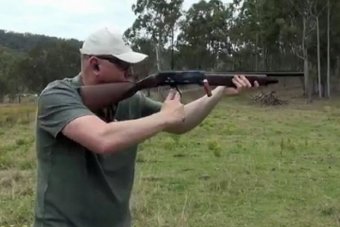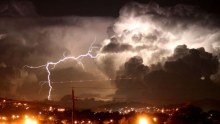Adler shotgun: States must come to a consensus on controversial firearm, says Tim Fischer
Updated
Former deputy prime minister Tim Fischer is urging the states and territories to come to an agreement on classifying the controversial Adler shotgun.
There is speculation the states have reached a consensus to re-classify the gun into the restrictive category D, ahead of their COAG meeting tomorrow.
A category D classification would mean only professional shooters would be able to use the weapon.
Mr Fischer helped craft Australia's gun laws with John Howard following the massacre at Port Arthur in 1996, and says the Howard government's laws should be maintained.
"It's up to the states to make that determination and reach harmonisation and if they don't it's upon their heads," he said.
"But we cannot water down the core principles of the John Howard gun laws."
This week Nationals MPs Mark Coulton, Ken O'Dowd, Bridget McKenzie and Liberal MP Ian Goodenough have all argued that the weapon should be put into category B, which means more people would be able to access the weapon.
Their calls were backed by the Deputy Prime Minister Barnaby Joyce, who urged the states to reconsider the D classification.
But Mr Fischer said the Nationals were still supporting John Howard's gun laws, despite their stance on the Adler.
"I've not heard any one of them say there should not be other than harmony across the states and Barnaby Joyce patiently explained that again the other night … let's see where the states end up," he said.
Concern over increased influence from the NRA
Mr Fischer, who led the Nationals Party from 1990 to 1999, said he was worried by what he saw as the increasing influence of the National Rifle Association in Australia.
"This whole Adler push is a play straight out of the National Rifle Association of the United States of America that poured millions into the Trump campaign," he said.
"We can see their tactics as they try to tear down Australia to a pathway of being 15 times more likely to be shot dead in the USA than in Australia, and I will always stand up against that."
He said the main difference between Australia and the USA was the National Firearms Agreement, which means all states and territories have to agree on gun classification.
"The one thing that does not exist in the USA is a harmonisation of their gun laws," he said.
"New York State and New York City have stricter gun laws than many states in the mid-west. We have harmonised gun laws in Australia, that is as it should be."
Higher taxes for guns bought from the US
Mr Fischer said Australia should consider sending a message to the US about its failure to introduce effective gun control laws by putting a tariff on gun imports proportionate to the number of massacres that took place in the country.
"If [Donald] Trump is going to pull the USA out of the WTO [World Trade Organisation] let's start applying a tariff to all guns being legally imported from the USA to Australia, and that tariff should equal the number of gun massacres of the previous year," he said.
"That would mean at the moment a 372 per cent tariff, on the FBI count that's how many gun massacres there were in the USA."
Mr Fischer said applying a tariff could also promote local manufacturing in towns like Lithgow in the NSW Central Tablelands where there was already a small gun factory.
"I'd like to see Lithgow making legal weapons vigorously," he said.
"If Austria can make the Glock [pistol], Australia should be able to make the Lithgow universal gun."
Topics: government-and-politics, disasters-and-accidents, federal-government, laws, nationals, australia
First posted










